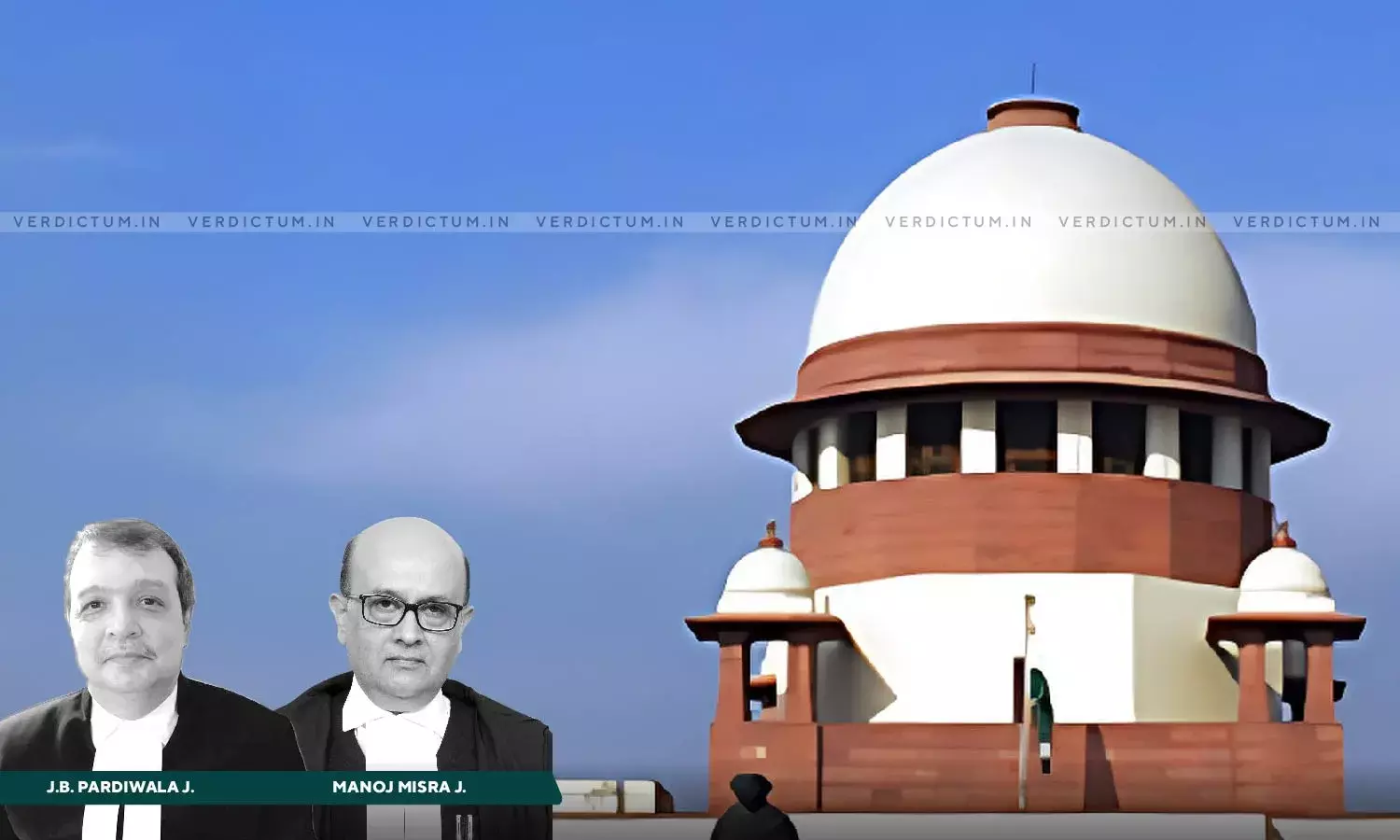Writ Court Should Not Quash An Order If It Revives Another Wrong Or Illegal Order: Supreme Court
The Supreme Court held that a writ court should not quash an order if it revives a wrong or illegal order.
To that end, the Bench of Justice JB Pardiwala and Justice Manoj Misra observed that, "It is well settled principle in law that issuance of a writ or quashing/setting aside of an order if revives another pernicious or wrong or illegal order then in that eventuality the writ court should not interfere in the matter and should refuse to exercise its discretionary power conferred upon it under Article 226 of the Constitution of India. The writ court should not quash the order if it revives a wrong or illegal order."
Had the High Court taken the view that the Additional Commissioner had no jurisdiction and the order passed by it was a nullity, the result would have been the revival of the illegal order passed by the Additional Collector confirming the sale, the court noted thus while refusing to interfere with a judgment passed by the Bombay High Court.
In this case, Respondent No.1's properties were unlawfully sold to the Appellant through an auction overseen by the Tehsildar. This transaction violated the Maharashtra Land Revenue Code, 1966, specifically Section 194, which mandates a 30-day notice period before such auctions.
Contrary to legal requirements, the sale certificate was issued on the same day as the auction, without awaiting confirmation by the Additional Collector as required under Section 212 of the Revenue Code. In this case, Respondent No.1's properties were unlawfully sold to the Appellant through an auction overseen by the Tehsildar. This transaction violated the Maharashtra Land Revenue Code, 1966, specifically Section 194, which mandates a 30-day notice period before such auctions. Contrary to legal requirements, the sale certificate was issued on the same day as the auction, without awaiting confirmation by the Additional Collector as required under Section 212 of the Revenue Code.
The Apex Court, citing Section 141 of the Civil Procedure Code (CPC) and the case of Chilamkurti Bala Subrahmanyam v. Samanthapudi Vijaya Lakshmi, underscored that CPC provisions do not extend to Article 226 proceedings. The Court emphasized that it would be unjust to require a party to challenge auction proceedings, deemed null and void under Order 21 Rule 90 of the CPC, which are in gross violation of the law.
The Bench also expressed concerns over corruption and emphasized the judiciary's duty to ensure fairness and transparency in public auctions conducted by state authorities, aligning with constitutional principles of equality before the law (Article 14).
The Court firmly established that under Article 226 jurisdiction, the High Court possesses unfettered authority to issue appropriate orders, unaffected by CPC provisions like Order 21 Rule 90. It clarified that the requirements of CPC rules cannot restrict the exercise of constitutional powers under Article 226, particularly in cases where state actions are found to be arbitrary and unfair. Notably, the Court rejected the applicability of Order 21 Rule 90 to writ proceedings, stressing that such procedural norms should not hinder justice when state actions are illegal rather than merely irregular.
Highlighting the case as one of blatant illegality committed by the Tehsildar in selling property without adherence to Maharashtra Land Revenue Code provisions, the Court cautioned against applying CPC provisions that would compel the aggrieved party to prove such illegality under Order 21 Rule 90. The judgment emphasized that overlooking such illegalities in favor of strict procedural compliance would undermine justice and fairness.
Despite finding the appellant's purchase of the respondent's property illegal, the Court refrained from immediately transferring possession back to the respondent. Instead, it directed the appellant to deposit Rs. 4,00,00,000/- with the Asset Reconstruction Company, to which the respondent owed a debt. The Court warned that failure to comply would result in competent authorities taking possession of the property for resale through fresh auction proceedings, ensuring justice and compliance with legal norms.
The Court concluded with a reminder that public functionaries must prioritize duty over power, and actions affecting the public must adhere to principles of fairness and reasonableness. It underscored that actions contrary to these principles, even if ostensibly without personal gain, are arbitrary and therefore ultra vires.
Cause Title: M/s Al-Can Export Pvt. Ltd. vs Prestige HM Polycontainers Ltd. & Ors.
Click here to read/download the Judgment




